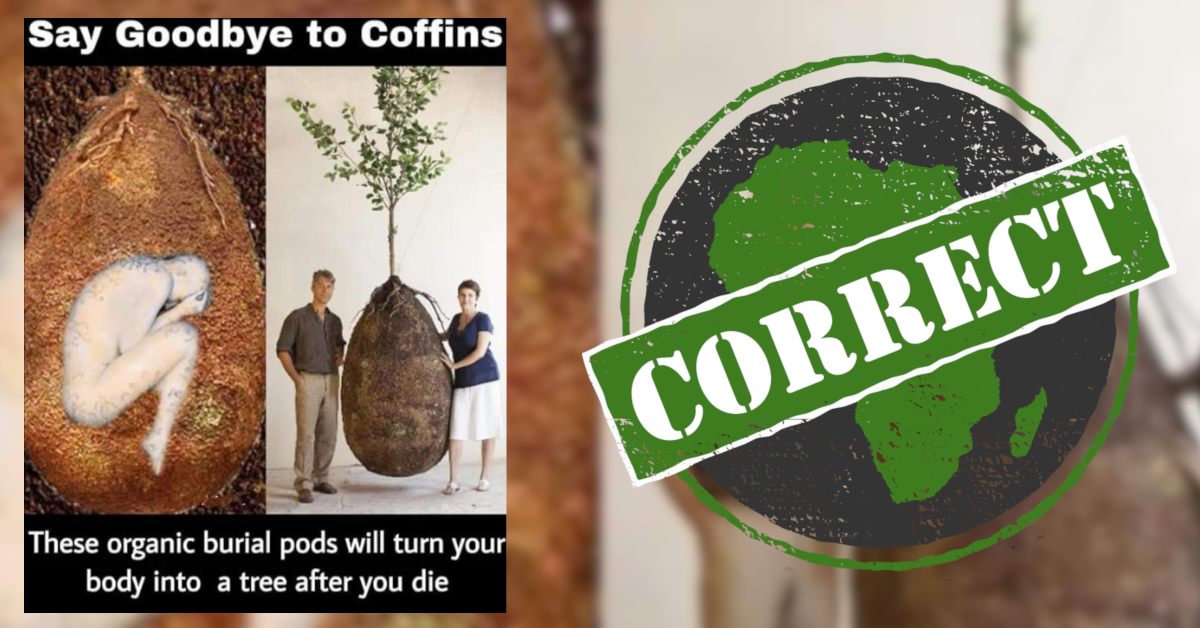Few of us spend much time thinking about how we might be buried one day. But a meme shared on Facebook in South Africa catches the eye by highlighting an unusual option for disposing of your mortal remains.
It’s headed “Say Goodbye to Coffins” and one of its two images is an illustration of a person lying curled in the foetal position in a large, potato-like underground pod.
A photo alongside this image shows two people standing next to a suspended soil pod with a tree growing out of the top of it.
Text underneath these images says: “These organic burial pods will turn your body into a tree after you die.”
The meme has been flagged as possibly false by Facebook’s fact-checking system. So are burial pods really a new alternative to coffins?

In 2016 US National Public Radio, or NPR, reported that the idea for “earth pods” was developed in Italy.
Instead of a tree being cut down for wood to make a traditional coffin, the environmentally friendly pods helped fertilise a young tree.
US news organisation CNN reported in 2018 that “the remains provide nutrients to a sapling planted right above it”.
The main champions of organic burial pods is Capsula Mundi, an organisation based in Italy, which has received international media attention.
Capsula Mundi first exhibited the idea of an egg-shaped burial pod in 2003, but says on its website that “Capsula Mundi for the body is still in a start-up phase”.
The company sells small pods or urns made of biodegradable material for the burial of human ashes. The egg-shaped pod, about the size of a rugby ball, is buried like a “seed” in the ground, and a tree is planted in the same hole or next to it as a memorial to the dead.
The process is also illustrated in a short video.
But burying a body in a larger pod is not legal in Italy. The concept, which the organisation still promotes, is for corpses to be placed in the foetal position in larger pods, just like in the illustration shared on Facebook.
In 2018 South African news site Times Live reported that despite the country’s largest cities running out of graveyard space, burial pods were not available. And we could find no evidence of any similar service offered in South Africa in 2020.
More environmentally friendly options than a traditional coffin are available, however. The Sonja Smith Elite Funeral Group offers biodegradable coffins made from wicker, seagrass or cocostick materials. But you can’t be buried like a seed in the ground just yet. – Taryn Willows
It’s headed “Say Goodbye to Coffins” and one of its two images is an illustration of a person lying curled in the foetal position in a large, potato-like underground pod.
A photo alongside this image shows two people standing next to a suspended soil pod with a tree growing out of the top of it.
Text underneath these images says: “These organic burial pods will turn your body into a tree after you die.”
The meme has been flagged as possibly false by Facebook’s fact-checking system. So are burial pods really a new alternative to coffins?

Remains provide nutrients to tree sapling
In 2016 US National Public Radio, or NPR, reported that the idea for “earth pods” was developed in Italy.
Instead of a tree being cut down for wood to make a traditional coffin, the environmentally friendly pods helped fertilise a young tree.
US news organisation CNN reported in 2018 that “the remains provide nutrients to a sapling planted right above it”.
The main champions of organic burial pods is Capsula Mundi, an organisation based in Italy, which has received international media attention.
Ashes can be buried, not corpse
Capsula Mundi first exhibited the idea of an egg-shaped burial pod in 2003, but says on its website that “Capsula Mundi for the body is still in a start-up phase”.
The company sells small pods or urns made of biodegradable material for the burial of human ashes. The egg-shaped pod, about the size of a rugby ball, is buried like a “seed” in the ground, and a tree is planted in the same hole or next to it as a memorial to the dead.
The process is also illustrated in a short video.
But burying a body in a larger pod is not legal in Italy. The concept, which the organisation still promotes, is for corpses to be placed in the foetal position in larger pods, just like in the illustration shared on Facebook.
In 2018 South African news site Times Live reported that despite the country’s largest cities running out of graveyard space, burial pods were not available. And we could find no evidence of any similar service offered in South Africa in 2020.
More environmentally friendly options than a traditional coffin are available, however. The Sonja Smith Elite Funeral Group offers biodegradable coffins made from wicker, seagrass or cocostick materials. But you can’t be buried like a seed in the ground just yet. – Taryn Willows
Republish our content for free
For publishers: what to do if your post is rated false
A fact-checker has rated your Facebook or Instagram post as “false”, “altered”, “partly false” or “missing context”. This could have serious consequences. What do you do?
Click on our guide for the steps you should follow.
Publishers guideAfrica Check teams up with Facebook
Africa Check is a partner in Meta's third-party fact-checking programme to help stop the spread of false information on social media.
The content we rate as “false” will be downgraded on Facebook and Instagram. This means fewer people will see it.
You can also help identify false information on Facebook. This guide explains how.


Add new comment